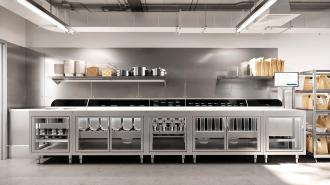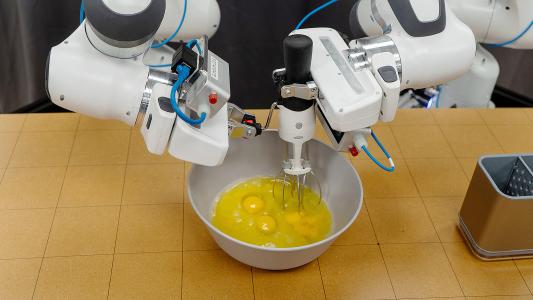Chipotle is testing a new robot that makes burrito bowls and salads, and it’ll work under the same table where employees whip up tacos, burritos, and quesadillas.
The challenge: Diners seemingly can’t get enough of Chipotle’s fast-casual Mexican food, and to keep up with demand, most of its locations now have two “makelines” — the counter of ingredients where orders are filled — one for in-house customers and one for online orders.
Even then, things get hectic during the lunch and dinner rushes, and stores sometimes have to choose between pulling workers off a line to prep more ingredients or filling orders more quickly with what is available, Curt Garner, Chipotle’s chief customer and technology officer, told Fast Company.
Chef bot: Chipotle has been exploring the use of robots to help human workers and keep its kitchens running smoothly — in July, it unveiled Autocado, an avocado-prepping bot, and in 2022, it started experimenting with Chippy, a bot that makes tortilla chips.
Now, it is testing Hyphen, a robot designed to create burrito bowls and salads under the makeline where workers fill digital orders. If this testing goes well, the robot will be deployed at one location for validation before being rolled out to more stores.
How it works: If an online order includes a burrito bowl or salad, that dish will be routed to Hyphen. The machine moves a bowl beneath the makeline, stopping below the containers filled with the necessary ingredients, which are automatically portioned out and dispensed into the bowl.
When the burrito bowl or salad is complete, Hyphen moves it to the top of the makeline so that a worker can add a lid. They then bag it up with any tacos, burritos, or quesadillas in the order, which are still made by hand. (Filling and rolling burritos is seemingly an art form that is still beyond robots.)
Looking ahead: Chipotle says about 65% of its online orders are for burrito bowls or salads, so Hyphen has the potential to dramatically reduce the workloads of people on the online makeline without outright replacing them — Chipotle still needs them to make the other 35% of orders.
However, Hyphen is potentially replacing new jobs.
“I can’t predict where all of this is going to go at this point.”
Curt Garner
While restaurants all over the country have been dealing with labor shortages, Garner told Fast Company staffing at Chipotle is the “best it’s been” in five or six years, so hiring more people to avoid having to pull anyone off the line to prep ingredients during a rush is seemingly within the realm of possibility.
Thanks to Hyphen, existing workers should now have time to do that, but Garner said Chipotle isn’t ruling out the possibility of automating more tasks in the future, so it’s possible robots could let stores function with fewer employees in the future.
“I think the cycles are going to continue to accelerate, and I can’t predict where all of this is going to go at this point,” he told Fast Company.
We’d love to hear from you! If you have a comment about this article or if you have a tip for a future Freethink story, please email us at [email protected].





